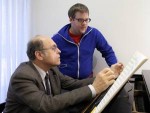Title
Though much has been made of Elliott Carter’s 99th birthday in the last few months, he is not the only Juilliard-connected composer to have inspired a musical tribute on the occasion of a milestone. A concert in Morse Hall on February 25—organized by his current students—celebrated the life and work of composition faculty member Samuel Adler, who turned 80 in March. Five of his chamber works were performed, representing a handful of the many highlights of Mr. Adler’s prolific output of chamber music over the past decade.
Body
Adler, born on March 4, 1928, in Mannheim, Germany, is known for his work as a composer and conductor, and as the author of three well-known books (on choral conducting, sight-singing, and the study of orchestration). He has served in a variety of positions, ranging from conductor of the U.S. Army’s Seventh Army Symphony Orchestra (which he himself founded in 1952) to music director of Temple Emanu-El in Dallas, Tex., Adler taught composition at the University of North Texas from 1957 to 1977 and at the Eastman School of Music (where he currently holds the title of professor emeritus) from 1966 to 1994; he has been a member of Juilliard’s composition faculty since 1997. Commissioned by some of the most prominent music organizations in the United States, Adler has written compositions for the Cleveland Orchestra, National Symphony, Pittsburgh Symphony, American Brass Quintet, Ying Quartet, and the American String Quartet, among many others. With more than 400 published works to date, Samuel Adler is undoubtedly one of contemporary American music’s giants.
So far this year has seen 15 all-Adler concerts held around the country in honor of his birthday. Though many of these occasions have been presented by professionals, Adler confessed that “the students showed a spirit on Monday that is very seldom encountered in any setting. If a composer could dream of an enthusiastic performance from musicians with technique of the highest standard, then it would be a concert like this one. They threw themselves into the music.”
Though the event was initiated by students, the celebration’s choice of music was left for Adler himself to decide. The first of his selections was Festschrift, a piano piece commissioned for a professor’s retirement. Slow, meditative music gives way to the fast, harmonious second section that—according to third-year pianist and composer Michael Brown, who studies with Adler and performed it at the concert—is both “devilishy difficult” and “very satisfying to play.” This was followed by the Sonata for Violin and Piano, a three-movement work beginning with a declamatory, urgent dialog between the two instruments, with repeated figures alternating with concentrated sections of contrapuntal writing. The slow and hauntingly lyrical second movement charges into the final movement, which sprints to a virtuosic finish. Michelle Ross, a violinist and composer who has also studied with Adler, and pianist Steve Beck performed the Sonata.
Adler’s String Trio, subtitled “Five Snapshots,” ended the first half of the concert. Five movements alternate between robust extroversion and fragile introversion, culminating in an insistent and harmonically striking last movement. The Adagio (the fourth movement), with its poignant and intense unisons that reappear over its course, was communicated with particular expressiveness by violinist and composer David Fulmer, violist Kyle Armbrust, and cellist Claire Bryant.
A brief intermission preceded Adler’s Caccia for two flutes. Along with the Trio (which is his most recently completed piece), this work puts forth the distinction between calm and active states, with interwoven lines in the fast sections literally “chasing” one after the other. The last composition of the evening, his Eighth String Quartet—performed by violinists Francesca Anderegg and Emilia Ann-Gendron, violist Luke Fleming, and cellist Se-Doo Park—is a wonderful work whose four movements demonstrate a sophisticated sense of timing and a strong psychological underpinning.
A diverse group of people attended the concert, representing an astounding number of people Samuel Adler has affected over the years. A few members of the first class he taught at Eastman, Adler told me after the concert, had come to celebrate with him, as had composers Fabian Lévy, Reiko Füting, Juilliard faculty member Eric Ewazen (who studied composition under Adler at Eastman), and many other faculty members at Juilliard.
Having always been a student of Mr. Adler’s here at Juilliard, I was thrilled at the prospect of attending—for the first time ever—a concert dedicated exclusively to his music. After getting to know Adler through my lessons, and seeing how genuinely caring he is for each one of his students, the selections played were that much more special; in them, his painstaking attention to detail and heartfelt love for music resplendently shone through in a way that a recording could never capture.





